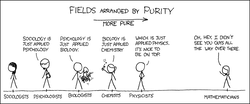- Joined
- Sep 6, 2009
- Messages
- 1,213
- Reaction score
- 42
- Age
- 36
I just had an incredibly long winded debate with Hemeriodius over the merits of psychology. I decided I would post my side of the argument here in hopes of perhaps starting a decent discussion.
The field of psychology seems ungrounded in science. I can think of no science, save psychology, that has ever made a vague or otherwise disputable claim and touted it as 'fact'.
Before I get started I will admit that there is some real science in psychology, but that does not mean psychology itself is a science. Neurology (at least as I understand it) is a subfield of psychology and it is indisputably scientific. Neurology would claim, for example, that X chemical acting on Y part of the brain produces Z result. That is an indisputable, objective fact. Neurology would conjecture that bipolar disorder (disorder meaning 'out of the ordinary') is caused by certain chemicals acting in a certain way on the brain. It would never attempt to conjecture, however, that having bipolar disorder is somehow 'wrong'. It may claim that a certain drug would change the way a person behaves, but it would never claim that a person with bipolar disorder should seek treatment.
Psychology, on the other hand, seems almost entirely constructed on these subjective claims. Nowhere is the subjectivity of psychology more apparent than in mental 'illness'.
You can objectively describe a sociopath. You can objectively describe the ratio of sociopaths to non sociopaths in a given society. But how can you objectively claim that being a sociopath is 'wrong'? How can you claim that a sociopath is 'Ill' or 'unhealthy' or 'unstable'? These are subjective claims and science makes only objective claims.
All science (except psychology) makes objective, factual statements. "The earth is the center of the universe". That is a factual statement. The earth either is or is not the center of the universe. There is no middle ground and no room for opinions.
However, claiming that a depressed individual is "mentally unstable" or "unhealthy" is not quite so clear cut though, is it? I can easily make the claim that a person with suicidal thoughts is being perfectly rational and the only argument the psychologist can use to dispute that is to describe the individuals brain chemistry. But this presupposes that a humans brain chemistry is 'supposed to' be a certain way.
Where in physics, chemistry, or biology do we find presupposition? We don't because they are sciences and science does not presuppose. Any discipline that touts itself as a science and makes subjective claims is, simply, not a science. It is a philosophy.
Therefore, psychology is not science. It is pseudoscience and practitioners of psychology are nothing but quacks on par with alchemists, astrologers and clergymen.
The field of psychology seems ungrounded in science. I can think of no science, save psychology, that has ever made a vague or otherwise disputable claim and touted it as 'fact'.
Before I get started I will admit that there is some real science in psychology, but that does not mean psychology itself is a science. Neurology (at least as I understand it) is a subfield of psychology and it is indisputably scientific. Neurology would claim, for example, that X chemical acting on Y part of the brain produces Z result. That is an indisputable, objective fact. Neurology would conjecture that bipolar disorder (disorder meaning 'out of the ordinary') is caused by certain chemicals acting in a certain way on the brain. It would never attempt to conjecture, however, that having bipolar disorder is somehow 'wrong'. It may claim that a certain drug would change the way a person behaves, but it would never claim that a person with bipolar disorder should seek treatment.
Psychology, on the other hand, seems almost entirely constructed on these subjective claims. Nowhere is the subjectivity of psychology more apparent than in mental 'illness'.
You can objectively describe a sociopath. You can objectively describe the ratio of sociopaths to non sociopaths in a given society. But how can you objectively claim that being a sociopath is 'wrong'? How can you claim that a sociopath is 'Ill' or 'unhealthy' or 'unstable'? These are subjective claims and science makes only objective claims.
All science (except psychology) makes objective, factual statements. "The earth is the center of the universe". That is a factual statement. The earth either is or is not the center of the universe. There is no middle ground and no room for opinions.
However, claiming that a depressed individual is "mentally unstable" or "unhealthy" is not quite so clear cut though, is it? I can easily make the claim that a person with suicidal thoughts is being perfectly rational and the only argument the psychologist can use to dispute that is to describe the individuals brain chemistry. But this presupposes that a humans brain chemistry is 'supposed to' be a certain way.
Where in physics, chemistry, or biology do we find presupposition? We don't because they are sciences and science does not presuppose. Any discipline that touts itself as a science and makes subjective claims is, simply, not a science. It is a philosophy.
Therefore, psychology is not science. It is pseudoscience and practitioners of psychology are nothing but quacks on par with alchemists, astrologers and clergymen.




